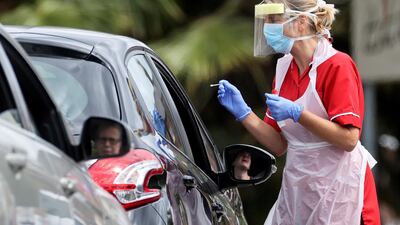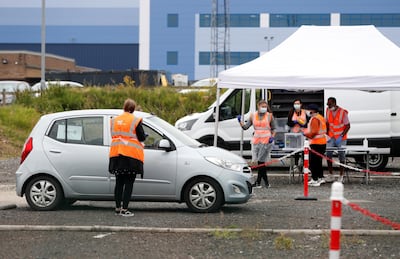The UK’s National Health Service is trialling a 10-minute test using nanotechnology biomarkers that could revolutionise the way that the coronavirus is detected.
The new test requires that a patient breathe normally into a mouthpiece for one minute so that a sample of the chemicals in their breath can be collected.
If the trial at Ashford and St Peter’s Hospitals NHS Foundation Trust, in Surrey, is successful it could end days of waiting and worry for patients.
Dr Stephen Winchester, medical virology consultant at the hospital and principal investigator on the research, said the test was a “potentially ground-breaking project”.
“As the coronavirus pandemic develops, it’s clear that our response should be long term and pre-emptive, and advances in research, diagnosis, treatment and technology will be absolutely key to managing future outbreaks and protecting communities,” Dr Winchester said in a statement.
“It has the potential to provide an improved experience for patients and aid clinical decision-making.
“It’s a great example of the fields of technology and medical science working closely together and the Ashford and St Peter’s Hospitals’ team are very excited to be part of this potentially ground-breaking project.”
The UK has had the worst death toll in Europe with 41,535 fatalities among its 329,883 cases.
Lockdown orders are being largely lifted across the UK as the government tries to reopen the economy, but there are concerns that rising death rates will follow.
The current Covid-19 testing method involves a swab test, after which people must self-isolate for up to three days to wait for the results.
The new test, developed by ANCON Medical, searches for chemicals known as volatile organic compounds (VOGs) – and their presence is analysed by computer and compared to VOG levels found in the breath of infected patients. The breath test, unlike the swab test, is also non-invasive.
If proven to be effective, the new technology could be rolled out quickly to testing centres because training for those who would use it is easy, the NHS trust said.
On Wednesday, scientists from the University of Cambridge won government funding worth £1.9 million to start trials on a DNA-based vaccine that aims to protect against multiple coronaviruses.
The scientists behind the vaccine said their approach, which uses genetic sequences of all known coronaviruses to hone the immune response, could help avoid the adverse effects of a hyper-inflammatory immune response.
"We're looking for chinks in its armour, crucial pieces of the virus that we can use to construct the vaccine to direct the immune response in the right direction," Jonathan Heeney, head of the Laboratory of Viral Zoonotics at the University of Cambridge, said.
More than 30 other potential vaccines are in clinical trials, with at least 140 more at the preclinical stage, according to the World Health Organisation.
Front-runners include one from the University of Oxford, working with AstraZeneca Plc, and one from Moderna Inc. A handful of DNA-based vaccines are also being tested, including one from Inovio Pharmaceuticals Inc.



